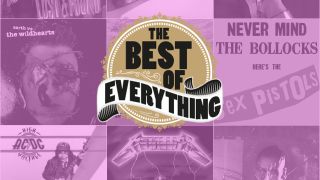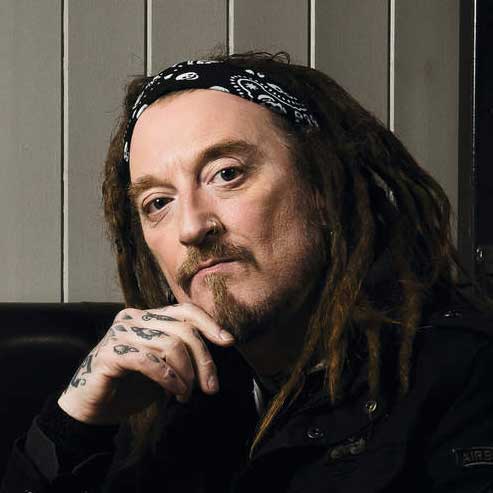“What was the best year for rock music?”
It’s a grand pub argument genuinely worthy of its status, isn’t it?
When Prince jammed for fifteen days. When Nickleback changed the world. When U2 finally retired. You’ve all got yours, and you’ll continue to have them. Trouble is you’re wrong.
Not because yours differs from mine (although mine is patently correct) but because it’s an argument that is actually necessary. We need to remind ourselves that we’re so passionate about music that we’ll engage in beer wars and fervently slur until dawn on this most essential of topics. Few things stir the same fire within the hearts of loyal supporters of any cause.
And in this confused, confusing age where too many new bands either sit like baby birds waiting for success to locate their needy little beaks, only to deservedly die of laziness, there are genuine musicians who want to work as hard as their peers. Who want to know how to do it, like a pro.
Fired-up young players who neither expect the gift of a free audience by fan funded enterprises, nor expect to get rich from streaming sites. Smart kids, the righteous creators of tomorrow.
Y’see, now is the time to get practical, to wake up and learn to survive. Don’t eat the bullshit, there is no easy route to being part of the future.
Your fellow musicians will be taken down like the hundreds of millions of sperm that were ejaculated along with you. And only you will make it, through sheer determination and a fierce imagination. And balls the size of Motorhead’s stage volume.
For you it’s not about financial booms or golden eras of platinum returns, it’s about inspirational bands that reshaped the future. Those explosions of style and sound that influenced all that followed and made it hard to imagine a time before them.
You don’t want to be the richest or the most pampered, you want to be the most respected and highly regarded. Money dies with you but your legend lives on. And nothing denotes this statement this more than great music.
And so it is, with this pioneering spirit fanning the flames of my heart, that I present the 10 best years of music, in no order whatsoever other than a chronological one.
So don’t argue. I’m right. And mine’s a pint.
1973
As the Vietnam war finally limped to an inglorious conclusion and Watergate freshly enraged an already heavily-politicised American youth, the arts were directly inspired by the ire. The gloves were off and an adult rating was rightfully held as a goal and not a threat. Movies got tough, with Bruce Lee kicking in new levels of violence and The Exorcist bringing hardcore horror into the family dynamic, with devastating effect on an unprepared audience. Music would also follow suit as Iggy And The Stooges unleashed Raw Power (1973) cheek to cheek with New York Dolls’ debut album, the UK rock invasion of USA officially became a monster with Led Zeppelin and The Rolling Stones creating arena rock and a new band called Kiss were freshly signed.
Everything was big and getting bigger. Rules were being written by an excited and utterly overwhelmed industry. Meanwhile, on British soil an entirely different beast was being given grubby life.
As David Bowie kills off Ziggy Stardust, the death is celebrated by a storm of visually inspired bands, only this time with trouble in mind. Even Queen’s debut album is a muted affair next to glam rock’s assault on the charts. Brickies in blouses disturb the ranks of waif-like Marc Bolan’s T Rex and the tackily refined chic of Roxy Music as the stomping anthems of The Sweet, Slade, Mott The Hoople, Wizzard, Mud, Suzi Quatro and Gary Glitter (R.I.P) gatecrash the party.
It was arguably the first wave of punk. It was outrageous, it was raucous, it was aimed at a wayward youth and parents hated it, yet all the while glam kept its tongue firmly lodged in its heavily Max Factored cheek. It knew it had limited shelf life, and it behaved like it. It partied in the precious moment and created waves that would directly affect cultural tastes and establish fresh boundaries from this point on.
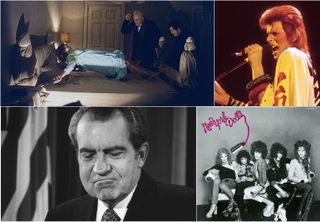
Clockwise from top left: ‘The Exorcist’, David Bowie, the New York Dolls’ self-titled debut album and Richard Nixon
1975
I think part of the reason I don’t like heavy metal was that I grew up with bands like Thin Lizzy, Sparks, Montrose and The Rolling Stones, all of whom where doing great things in the mid 70s. Ronnie Wood had just joined the Stones, which was the perfect match and turned me into a huge fan. And AC/DC released High Voltage, still my favourite album of theirs.Friends of my parents who would play Welcome To My Nightmare by Alice Cooper which made me think that all albums must be this good. What with Bohemian Rhapsody being Number One in the charts, I just figured music was simply a magical element. It wasn’t until later that I realised that Welcome To My Nightmare would be my generation’s Pet Sounds, and only a few albums ever made would be this good, and Bohemian Rhapsody was actively altering the limitations of radio – as well as my own idea of composition, by being a lofty 5:55 in length. Spooky number, eh?
Status Quo had also reached the peak of their powers, something even they didn’t know until they derailed some years later, and The Sweet were in the charts with Fox On The Run, a song that still makes me feel like a kid to this day. All in all, a quality period where the songs were as important as the musicians. Something I’m glad I got to learn first hand.
1977
As the Queen’s Silver Jubilee struggles to boost morale against current affairs, the death of Elvis brings an era to an inevitable close. In a mere four years since glam pretended to be both big and clever, genuine musical giants like Fleetwood Mac and Kiss are now regarded with scorn, as a youth, robbed of opportunities, seek out something closer in spirit to their own feelings of rejection.
And the already hissing device known as punk rock is that release.
The Clash, The Damned, The Sex Pistols, Blondie, Ramones, Buzzcocks and so many more utterly brilliant realisations of frustration and nihilism charged uninvited into the homes and hearts of a culturally starved nation. While rebellion was nothing new in entertainment, the music had never sounded like its soundtrack until now. It wasn’t only exciting, it was liberating. Anyone could play punk with just a rudimentary understanding of music. In fact, the simple approach worked in its favour, pushing would-be criminals into bands and social unrest into lyrics. Protest songs never sounded so fresh and vital, and the music still thrills to this day. You don’t like punk? I don’t like you.
THE EARLY 80S: THE SECOND WAVE OF PUNK
As a reaction against a feeble wave of pop staring wistfully aloft for an MTV audience, the youth were getting restless elsewhere. From Edinburgh to Washington DC, bands were becoming more socially conscious, less commercial and, as a result, faster. From UK heavyweights like The Exploited, Discharge, Anti-Nowhere League, GBH, Angelic Upstarts and the UK Oi movement, to their American counterparts Bad Brains, Black Flag, the Misfits, Minor Threat, Dead Kennedys and the whole NYC hardcore movement, things were going back to basics and away from the mainstream.Inspiring independence in approach as well as sound, the hardcore/post punk scene would inspire bands like Big Black, Hüsker Dü and Ministry who’d go on to influence everything we know as alternative music.
It’s hard to think of a time when alternative music was a genuine underground phenomenon, and not simply a marketing technique. Still, as with all great music, it came as a reaction to what it considered insipid and socially irrelevant. Pissed off people with a social conscience have always been the greatest inspirational force in music.
It’s terrifying to think about the state of music if everyone was in it to get rich and laid, as Gene Simmons sincerely believes musicians are.
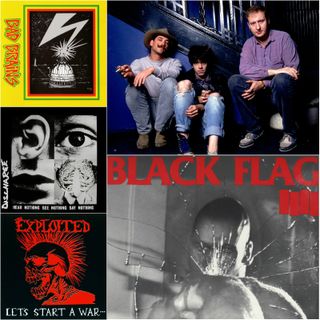
Clockwise from top left: Bad Brains’s 1982 self-titled debut album, Hüsker Dü, Black Flag’s 1981 album ‘Damaged’, The Exploited’s 1983 album ‘Let’s Start A War’ and Discharge’s ‘Hear Nothing, See Nothing, See Nothing’ (1982) (Hüsker Dü photo: Getty)
THE EARLY TO MID 80S: THRASH
Taking the aggression of hardcore and removing the cringeworthy histrionics of heavy metal, thrash was a genre that needed to exist for pissed-off kids who could play. Brought up on Motörhead and Venom and hearing it played even faster by Discharge, I couldn’t conceive of anything as exciting in the world of rock, until I heard Suicidal Tendencies. Then I was hooked on how heavy a record could actually sound.
Enter The Big Three (fuck Megadeth): Metallica with Ride The Lightning (1984), Anthrax with Spreading The Disease (1985) and Slayer with Reign In Blood (1986).
Okay, so they’d made thinner sounding albums before these releases, but those three albums are the birth of The Riff as far as I’m concerned. Dropping down breakneck riffage to half-time chugging guitars was new and sexy as fuck. It was no less devastating when later handed to Pantera and Sepultura to run with.
There’s a lot of debate as to what thrash music actually is and what it isn’t. To me, an equal blend of hardcore punk and the heavier side of metal is necessary, but removing the cliches is essential.
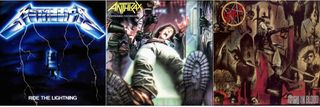
COWPUNK/ALT-COUNTRY: 1981⁄85
While the metal world was donning lipstick and heels, there was something way more interesting going on in the world of country music. Okay, I’ll admit to having a fondness for the OTT antics of Mötley Crüe, but surely even fans of 80s glam can’t stand the music now? While, with the benefit of time, bands like Long Ryders, Jason & the Scorchers, Lone Justice, Hoodoo Gurus and Tex & The Horseheads sound even better today than they ever did. Mixing country with punk is the equivalent of mixing dynamite with ice cream, and the results still hold up to this day.
It was an outrageous idea, but Jason & The Scorchers not only made it work – due to a genuine love for both genres – but went on to influence an entire nation, much like Ramones before them. Their immediate effect was seen and heard in bands like Whiskeytown (Ryan Adams’ opening gambit) and Wilco, and can now be heard (largely unfortunately) in pretty much everything that calls itself popular country today.
The energy of Jason & The Scorchers, the majesty of Maria McKee and Lone Justice, the unbridled recklessness of The Long Ryders and the songwriting suss of Hoodoo Gurus, all taking off from the ground that Gram Parsons left behind. It’s a sub-genre that went on to inspire to such a degree that its genuine origins are often forgotten.
But all fans of true country know where that sound came from, and the debt to these bands will never be forgotten as long as integrity in real country music still exists.
THE LATE ‘80S AND EARLY ‘90S: RAVE
I’d be lying if I said I wasn’t seduced by rave – especially the drugs. Everyone I knew was. It was an epidemic.The type of music I really loved, as well as stuff like Chemical Brothers and Fatboy Slim, was Dutch and German hardcore electro/dance that you’d find playing in garage parties and gay clubs. It mixed elements of industrial with the spirit of punk, and some of it was insanely heavy. The most fascinating thing about it was that you’d never know who it was you were listening to, either because of it being white label or you were just too pilled up to talk and just went with it.
I’ve never been a dancer but on ecstasy that didn’t matter at all, you still danced. Well, I was doing something on the dance floor anyway.
Occasionally, John Peel would play something and you’d yell, “That was the fucking song!”, and find out it was Identify The Beat by Bonkers Rezurrection or Bang On by Propellerheads. Otherwise, it was just a random and amazing racket, much like the punk clubs I’d go to as a kid.
Later the sounds went on to to be infused with other styles, which I also adored, whether it was the electro elements of Black Grape, Apollo 440 or Super Furry Animals, I’ve always had a soft spot for beats and loops. Even if you don’t care for the music it’s safe to say that there wasn’t a better time to be into music.
1991
As The Wildhearts were setting ourselves up to copy all my favourite bands, I couldn’t help but feel a sense of nostalgia that made the rehearsal room smell mouldy. I liked what I liked, but the magazines and TV of the time had a different take on what was seemingly important. Guns N’ Roses were undoubtedly the best of the bunch, but when that bunch was lead by rock behemoths Bon Jovi, it wouldn’t have taken Axl and Slash much to kill the opposition. GN’R obliterated all the rock music around at the time – and it was an unfair fight.Then Nirvana came along and everything changed. There aren’t many times when you can say that and it be genuinely true.
They had contempt for industry norms, they wrote songs that sounded like Cheap Trick played by Mudhoney and they sounded impossibly good. So much so that every single person in the world agreed, and they got as big as The Beatles.
Sitting around and watching this happen seemed like seeing a real life zombie apocalypse affect the world within weeks. Everyone was powerless. The perfect band had come along, and they kind of sucked. Which made them beyond perfect, it made them human.
The biggest band in the world sounded ropey and appeared to have a conscience and a sense of humour. The world doesn’t get much more perfect than that.
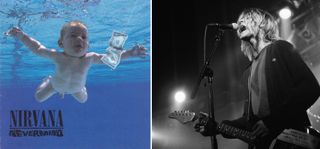
Nirvana’s 1991 album, ‘Nevermind’ and right, Kurt Cobain (Photo: Frans Schellekens/Redferns)
1993⁄1997: THE WILDHEARTS
How could I list my favourite times in music and miss out the band that I had more incredible experiences than anyone has a right to?We started out wanting to be the ultimate ‘fuck you’ to the industry, and went on to do exactly that. We did such a good job at it, in fact, that we destroyed any chances of achieving any mainstream success, but that was all part of my manifesto. I wouldn’t budge for the world, and the less flexible I became the more it infuriated the industry. I fucking loved it!
People say we were underachievers, but I respond by saying if anyone else acted the way we did you just wouldn’t have heard from them. The only reason they industry couldn’t keep us down or shut us up was the songs. We backed up our militant stance with great tunes, and the fact that I stood my ground is the reason why I still have an audience today.
If you want to make a living at being anti-establishment then you’d better have a lot more than just a loud mouth. I’m the most successful underachiever in the world – and believe me, that takes some doing.
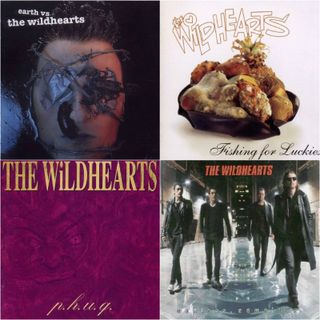
NOW
The state that music is in at the moment makes it potentially the most exciting it has ever been. The artist has the opportunity to be entirely in control, and that power will either be warranted by great imaginations or be crushed by greedy bastards who used to blame their shitty attitude on labels and management. There’s no-one to blame now. I hope that the absence of commercial radio and music TV will usher in some great approaches to noisy, anti-commercial music, while more melodic music will explore arrangements outside of the traditional single-length radio pleaser formula.
Young musicians and new bands need to self-educate, which is surprisingly easy when your own interests are the basis behind your thirst for knowledge.
Bands also need to start keeping things in-house. Stop paying managers, stop paying labels and start gaining a following from the ground up, by hard work and sheer determination. That’ll separate the wheat from the bollocks for a start.
Stop paying outside help, give your mates and family jobs instead. Work hard. Treat people right and be thankful for every single person who likes your music. I truly believe that everyone can make a living doing this. I also believe that it ain’t going to come easy for anyone, not if they want to keep on doing it.
Self-sufficiency, survival techniques and a DIY approach are going to save your bacon and allow you to continue making music without the threat of corporate negligence and redundancy – and you’ll keep the rights to your music for the first time ever.
If anyone says it’s hard for bands these days, throw a fucking drink at them. Preferably a hot one.
